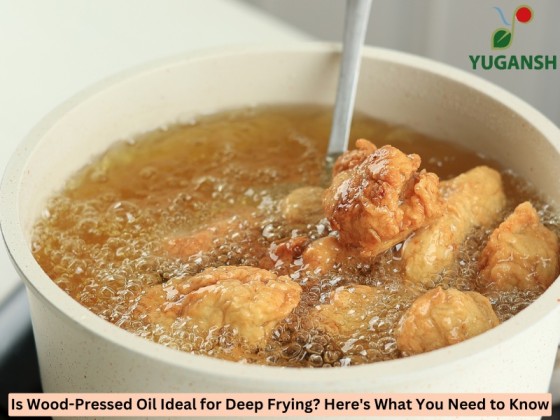Cooking oil is a very vital ingredient in cooking. Different oils are beneficial, depending on the cooking method. If you love fried food, then you might be asking which oil is good. Lately, wood-pressed oils have been criticised for their health benefits. But are they good for frying? Let’s dive into what you need to know.
What Are Wood-Pressed Oils?
This oil is known as Cold-pressed oils. Most of the extracted oils are achieved using ancient methods of wood pressing. With it, seeds and nuts will have to be crushed within a wooden press. This process mainly captures most of the nutrients and flavours in the oil. These do not have to go through chemicals or high heat as refined oils do. Wood-pressed oils are healthier and more natural.
Various pressings of wood-pressed oils include cold pressing of groundnut oil, sunflower oil, and mustard oil. The flavour and nutritional content profile are different for all the oils. But regarding deep frying, there are a few other concerns that also have to be addressed at the same time.
Smoke Point: The key Factor for Deep Frying
The ability of oil to be used in deep frying is termed as the smoke point. Smoke point refers to the temperature where an oil starts degrading. Once oil reaches the smoke point, it begins to degrade and produces harmful compounds. Among other characteristics preferred when an oil option exists for frying, one characteristic is the smoke point.
Wood-pressed oils often have much lower smoke points than refined oils. For example, cold-pressed sunflower oil smokes at around 160°C. This is considerably lower than canola oil, a highly refined oil. These oils may then not stand high frying temperatures.
Are Wood-Pressed Oils Good for Deep Frying?
Although wood-pressed oils are rich in nutrients, they are poor choices for deep frying. They break down very fast at high heat due to their relatively low smoke points. Such degradation would mean unhealthy compounds are formed in food. However, they can be used to fry at low temperatures.
However, it is a safer process with shallow frying or sautéing with wood-pressed oils. This way, you can get additional flavour to your recipes while retaining all the health benefits of these oils.
Health Benefits of Wood-Pressed Oils
Furthermore, wood-pressed oils cannot be used for deep frying, they have various health advantages. Most of the antioxidants, vitamins, and other good fats which are lost during refining are retained within these oils. Moreover, no chemicals or preservatives are there in wood-pressed oils.
For example, the flavour of Kachi ghani mustard oil is rich along with good nutrition because it contains omega-3 fatty acids and has anti-inflammatory features. At such a high smoke point, it is not advisable to fry at an even higher temperature.
Best Uses for Wood-Pressed Oils
If deep frying is not their best use, then what are wood-pressed oils for? These oils are a boon to dishes where their flavour stands out. Here’s how you can use them:
Cold Dishes: Wood-pressed oils are to be used for salads and dressings. This helps in the preservation of the nutrients and flavours.
Low-heat cooking: Stir-fries and sautes are perfect for wood-pressed oils. Low heat allows them to retain all their natural properties.
Finishing oil: Pour a good amount of cold-pressed groundnut oil over your dishes for that added bit of flavour.
These oils should be used in cold or lightly heated dishes so you get all their health benefits.
Types of Wood-Pressed Oils
Numerous types of wood-pressed oils come with various characteristics. Let’s take a little closer look at some of the most popular ones:
Kachi Ghani Mustard Oil: This oil is high in monounsaturated fats and has a strong flavour. Despite having a low smoke point, it will not be suitable for deep frying.
Cold Pressed Groundnut Oil: Groundnut oil possesses a relatively high smoke point. Therefore, it can be used for shallow frying but perhaps not for deep frying.
Cold Pressed Sunflower Oil: This sunflower oil is light in colour and consists of vitamin E. However, most of the cold-pressed oils have a low smoke point. Thus, it is not ideal for deep frying.
Alternatives for Deep Frying
If your menu includes deep-fried foods, then you do not have to worry about the calories. There are healthier options that can withstand high temperatures. Oils such as refined peanut oil and sunflower oil can tolerate great temperatures. They can take the heat which usually accompanies frying processes.
However, another is using it in other types of cooking. With that, though, wood-pressed oils are still excellent choices. You can already derive from the health benefits of wood-pressed oils through regular cooking. You just need to reserve them for dishes on lower heat.
Conclusion
These wood-pressed oils are simply packed full of nutrients and flavour. Still, while they are a joy to have in the kitchen, they don’t necessarily make for the best choice when you want to deep-fry something because their smoke points aren’t so high. Therefore, if you’re looking to fry with oils, you want refined oils that have a much better smoke point. Still, wood-pressed oils are nothing short of perfect for cold dishes and low-heat cooking. Make them a part of your diet, and you will have the opportunity to reap many health benefits without sacrificing taste.


